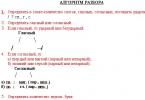A verbal noun in Russian is the part of speech most similar to the English gerund. Despite the fact that there is no formal gerund in the Russian language, the verbal noun has many common features with it. The main thing when studying such nouns is not to compare them with similar phenomena in other languages, but to “get to the bottom” of the essence. After all, their history of origin and application can shed light on many questions: not only philological, but also everyday, and even philosophical.
What it is?
Verbal nouns are a part of speech that is derived from a verb and performs a nominative function for actions. To put it simply, these nouns name actions and give them “names.” These "names" fall into two main categories:
- One category refers to the action itself. For example: create - creation, improve - improvement, simplify - simplification, heat - heating.
- The second category names the one who performs this action: to pursue - the pursuer, to kidnap - the kidnapper, to replace - the deputy, to represent - the representative.

To form such a noun, you can use the suffix method:
- -ni-, -ani-, -eni-: teach - training, instruct - instruction, allow - permission.
- -k-: lay - laying, charge - charging.
It looks like this: burn - burn, fly out - fly out, bribe - bribe.
Why use this?
Ideally, the use of verbal nouns is not strictly necessary and is mandatory only in the following cases:
- When it is impossible to choose a simpler verb analogue or rearrange the sentence.
- When the restructured proposal or its alternative version does not sound formal enough, does not match the tone of the event or resource for publication.
But if verbal nouns were used only for these purposes, they would not enter everyday communication so easily. However, under the guise of “innocence” there are other goals hidden.

Why is this actually used?
Politicians, economists, lab specialists, media workers and simply resourceful people have found alternative uses for verbal nouns. You just need to take a closer look at them to come to the same conclusion yourself. In fact, all examples of verbal nouns, in or out of context, sound very, very solid. In addition, sentences with them are often overloaded and difficult to understand, so it is easier to hide the true meaning behind them.
How to deal with supply overload?
Identifying chains of verbal nouns and turning them into something euphonious is a matter of practice. For example, the overloaded version would sound like this:
- The departure of the aircraft is scheduled for six o'clock.
- The experts decided to immediately implement a plan to improve the product.
Now let's try to simplify these sentences:
- The plane will take off at six o'clock.
- The experts decided to immediately implement a plan to improve the product. The experts decided to immediately improve the product.
In properties, a verbal noun is close to a gerund (although it is believed that, say, there is no gerund in the Russian language).
From one verbal stem it is possible to form two types of verbal nouns: deverbative of the action name - lat. nomen actionis (sowing, transformation, salvation) and the name of the actor or sender of the action - lat. nomen agentis (sower, transformer, rescuer).
In German, there are two types of verbal nouns: the substantivized infinitive, or “name of the process” (examples: sein - das Sein, schwimmen - das Schwimmen, etc.) and “name of the result” in -ung. Most verbs can form both the first and second forms; from “static” verbs, only the first form is usually formed; from “dynamic” verbs, both forms can be formed (the first has a more abstract meaning).
In relation to oriental languages, the verbal noun is traditionally called “masdar” (Arabic: مصدر ). It is the source of word formation according to the opinion of scientists of the Basri school of morphology. They argue this by saying that it only points to a certain concept or state. It is simpler and more elementary than a verb, which is burdened with a connection with time and the person of the actor. For example: شُكْرٌ غُفْرَانٌ “gratitude” - “ShuKRun” (the concept is not associated with time or with the figure), “forgiveness” - GuFRaanun (also there is not even a hint of an answer to the questions: “when?” and “who?”)
see also
Wikimedia Foundation. 2010.
See what a “verbal noun” is in other dictionaries:
See noun... Five-language dictionary of linguistic terms
The gerund is one of the non-finite (impersonal) forms of the verb available in many languages (English, Spanish, French, Latin, etc.). The verbal part of speech (along with the participle and gerund), expressing an action as an object. Answers... ... Wikipedia
Self-name: slüvensťĕ, vensťĕ Countries: Germany ... Wikipedia
A verbal noun (also a deverbative) in a number of inflected languages, including Russian, a noun formed directly from a verb. Examples: walking (from walk), eating (from eat). For many semantic and... ... Wikipedia
A verbal noun (also a deverbative) in a number of inflected languages, including Russian, a noun formed directly from a verb. Examples: walking (from walk), eating (from eat). For many semantic and... ... Wikipedia
VERBAL, verbal, verbal (gram.). Derived from the verb. A participle is a verbal adjective. Verbal noun. Ushakov's explanatory dictionary. D.N. Ushakov. 1935 1940 ... Ushakov's Explanatory Dictionary
Influence, influence, influence. 1 It is known that in the Russian literary language of the first half of the 18th century. influence was a word of high style (cf. book Slavic influence in the meaning of pour in) (see: Sreznevsky, 1, p. 379). Its synonym is on average and... ... History of words
FRAME, FRAMING The word frame is derived from the word frame in the professional (carpentry) dialect. The history of the word frame itself in Russian remains unclear. In modern usage, three main meanings are associated with the word frame: 1.... ... History of words
COLORING, BLOOMING In the Russian literary language of the 18th century. professional terminology of the sciences and arts was in a disorderly ferment. Borrowed words struggled with Russian terms and often supplanted them, especially in those areas... ... History of words
Books
- English language. Collection of exercises (DVD), Golitsynsky Yuri Borisovich. The most popular collection of exercises on English grammar is now in interactive form! In this interactive collection you will find grammar exercises on key grammar topics...
- English language. Workbook for the collection of exercises English. Grammar. 10-11 grade. Part 2, Yu. B. Golitsynsky. A collection of exercises on English grammar by Yu. B. Golitsynsky is widely used in the educational process of educational institutions in Russia and the CIS countries. The uniqueness of the technique...
In business speech, to express action, constructions of a verbal noun with the meaning of action and a semi-nominal verb are extremely actively used instead of a simple verb form, for example:
“to assist”, not “to assist”
“to provide assistance”, not “to help”
“clean up”, not “clean up”
“to carry out accounting”, not “to take into account”
"provide support" rather than "support"
“make repairs”, not “repair”.
Experts call this phenomenon “predicate splitting.” The content of the document is always a management action aimed at a specific object, and under these conditions, a phrase consisting of a verbal noun and a semi-nominal verb not only names the action (“produce”), but also designates the subject of this action (“repair”), while one the verb (“repair”) means this in a less explicit form.
Limited use of verbs in personal form
Written business communication is characterized by the non-personal (impersonal) nature of the presentation of the text, i.e. the use of verbs in the 1st and 2nd person form is limited, and verbs in the 3rd person form, as a rule, are used in an indefinitely personal meaning: “ The commission carried out an inspection and found..." "the act was signed by the members of the commission and approved by the management."
This also explains the predominance of passive constructions over active voice forms, for example:
“The project provides for the construction of a building that meets international standards” (instead of: “The project provides for...”); “Moscow organizations will supply electromechanical equipment to Hungary” (instead of: “Moscow organizations will supply...”)
“The possibility of liquidating the joint venture is being studied by the Department of External Relations of the Moscow Government” (instead of: “The Department of External Relations of the Moscow Government is studying...”).
Construction of sentences
A feature of business style is the predominant use of simple common sentences, one-part or two-part, with separate phrases, for example:
“Due to the extremely low efficiency of use of city property contributed to the authorized capital of the JV “MIO”, as well as due to the insufficient workload of the motor vehicle fleet and its unprofitability, we ask you to resolve the issue of transferring the city’s share (the Property Fund has been registered as one of the founders of the joint venture) to the Financial and Economic Department of the City Hall"
“Having reliable information about the large empty areas of federal subordination available in a number of Moscow districts that are not used due to corporatization and a sharp reduction in staffing levels, we consider it advisable to use such premises for the placement of federal structures by decisions of higher authorities.”
Such sentences, as a rule, contain participial and participial phrases, introductory words and phrases, clarifying circumstances, applications, additions. If the sentence is one-part (there is no subject, there is only a predicate denoting the key action), then it is usually constructed according to the following scheme: motivating part (justification) - key action - subject of the action.
If the sentence is two-part (there is both a subject and a predicate), then the sentence can be constructed according to the same basic scheme, but the designation of the key action will be preceded by an indication of the subject of the action (subject); the subject can be placed at the beginning of the text, for example:
“The specified fixed assets contributed to the authorized capital of the joint venture, after its liquidation, will be transferred to the balance of the Financial and Economic Department of the Mayor’s Office for the organization of maintenance of the vehicle fleet of the Mayor’s Office and the Administration of the Moscow Region”
“In accordance with your request, the department has considered the possibility of providing non-residential premises to the Russian news agency “Novosti” to house the newly organized magazine “Russia”.
In business speech, complex non-union and complex sentences with meanings of cause, conditions, purpose, explanatory and defining are often used:
“At the same time we inform (main sentence) that a draft decree of the Government of the Russian Federation has now been prepared on establishing tariffs for electricity supplied to agricultural consumers for production needs at the level of average costs with minimal profitability (add. offer)"
“Provided that thin-walled steel pipes are coated with reliable internal and external anti-corrosion coatings (subordinate clause), We consider it acceptable to use them when laying closed irrigation networks in the Non-Black Earth Zone of the Russian Federation (main proposal).”
The place of the subordinate clause in the main clause depends on which member of the main clause it explains:
If a subordinate clause explains any main word, it usually follows immediately after this word;
If the subordinate clause refers to the entire main sentence or to a predicate group, then it is placed before the main one if the circumstances of the action are emphasized, or after the main one if it explains the main idea of the sentence.
Instead of:
which are located in use of US-2, please transfer OKS.
Buildings, structures, equipment and adjacent territory of the mortar unit, located in use of US-2, please transfer OKS.
It is not allowed to combine participial and participial phrases with subordinate clauses as homogeneous members of a sentence.
Wrong:
Considering that the project on Pushkinskaya Square is one of the first major projects, which are financed The European Bank for Reconstruction and Development, we ask you to consider providing some benefits to Turkish and Russian partners implementing this project.
Right:
Considering that the project on Pushkinskaya Square is one of the first major projects, funded The European Bank for Reconstruction and Development, we ask you to consider providing some benefits to Turkish and Russian partners implementing this project.
When using participial phrases, it should be remembered that the participle must always be associated with a noun denoting the actor - the subject of the action, and in no case with the object.
Wrong:
Assessing the results of the department’s work, it has a high percentage of implemented developments.
Right:
When assessing the results of the department’s work, we note a high percentage of implemented developments.
A special type of sentences in business speech are complex, categorized enumerations, which make it possible to formalize the transmission of the same type of information using linguistic means:
“When considering this issue, the editors formulated specific requirements for the allocated premises:
It should not be located on one floor, but should have at least two halls with an area of 35-40 square meters. m each to accommodate computer equipment;
Must have at least 16 offices for 2-3 people. each and one meeting room;
The premises should not require renovation; a number of technical premises are needed.”
- A verbal noun (also a deverbative) in a number of inflected languages, including Russian, is a noun formed directly from a verb. Examples: walking (from walk), eating (from eat).
In many semantic and syntactic properties, the verbal noun is close to a gerund (although it is believed that, say, there is no gerund in the Russian language).
From one verbal stem it is possible to form two types of verbal nouns: deverbative of the action name - lat. nomen actionis (sowing, transforming, saving) and the name of the actor or sender of the action - lat. nomen agentis (sower, transformer, rescuer).
In German, there are two types of verbal nouns: the substantivized infinitive, or “name of the process” (examples: sein - das Sein, schwimmen - das Schwimmen, etc.) and “name of the result” in -ung. Most verbs can form both the first and second forms; from “static” verbs, only the first form is usually formed; from “dynamic” verbs, both forms can be formed (the first has a more abstract meaning).
In relation to oriental languages, the verbal noun is traditionally called “masdar” (Arabic: مصدر). It is the source of word formation according to the opinion of scientists of the Basri school of morphology. They argue this by saying that it only points to a certain concept or state. It is simpler and more elementary than a verb, which is burdened with a connection with time and the person of the actor. For example: شُكْرٌ غُفْرَانٌ “gratitude” - “ShuKRun” (the concept is not associated with time or with the figure), “forgiveness” - GuFRaanun (also there is not even a hint of an answer to the questions: “when?” and “who?”)
Verbal nouns are widely used in different styles of language:
In socio-political and specialized literature as terms formed in various ways:
using the suffix -ni-e (-ani-e, -eni-e), for example: concreting, loosening, denationalization, questioning, subtraction, addition, coordination, management;
using the suffix -k-a, for example: masonry, putty (process and result of the process); if there are options of both types (engraving - engraving, marking - marking, pressing - pressing, grinding - grinding), the first option has a more bookish character;
in a suffix-free way, for example: fly-out, press, firing, measuring, dumping, in the presence of options (heating - heating, firing - burning, draining - draining), a high degree of bookishness is retained behind the forms.
In official business speech, for example: The nomination of candidates has begun; The negotiations ended with the establishment of diplomatic relations; An agreement was reached to extend the agreement for the next five years; The request for leave has been granted.
In the headlines, for example: Launch of the space complex; Showing new films; Presentation of orders and awards; Homecoming. The usual formulation of plan items is phrases with a verbal noun as the main word.
- A verbal noun (also a deverbative) in a number of inflected languages, including Russian, is a noun formed directly from a verb. Examples: walking (from walk), eating (from eat).
In many semantic and syntactic properties, the verbal noun is close to a gerund (although it is believed that, say, there is no gerund in the Russian language).
From one verbal stem it is possible to form two types of verbal nouns: deverbative of the action name - lat. nomen actionis (sowing, transforming, saving) and the name of the actor or sender of the action - lat. nomen agentis (sower, transformer, rescuer).
In German, there are two types of verbal nouns: the substantivized infinitive, or “name of the process” (examples: sein - das Sein, schwimmen - das Schwimmen, etc.) and “name of the result” in -ung. Most verbs can form both the first and second forms; from “static” verbs, only the first form is usually formed; from “dynamic” verbs, both forms can be formed (the first has a more abstract meaning).
In relation to oriental languages, the verbal noun is traditionally called “masdar” (Arabic: مصدر). It is the source of word formation according to the opinion of scientists of the Basri school of morphology. They argue this by saying that it only points to a certain concept or state. It is simpler and more elementary than a verb, which is burdened with a connection with time and the person of the actor. For example: شُكْرٌ غُفْرَانٌ “gratitude” - “ShuKRun” (the concept is not associated with time or with the figure), “forgiveness” - GuFRaanun (also there is not even a hint of an answer to the questions: “when?” and “who?”)
Verbal nouns are widely used in different styles of language:
In socio-political and specialized literature as terms formed in various ways:
using the suffix -ni-e (-ani-e, -eni-e), for example: concreting, loosening, denationalization, questioning, subtraction, addition, coordination, management;
using the suffix -k-a, for example: masonry, putty (process and result of the process); if there are options of both types (engraving - engraving, marking - marking, pressing - pressing, grinding - grinding), the first option has a more bookish character;
in a suffix-free way, for example: fly-out, press, firing, measuring, dumping, in the presence of options (heating - heating, firing - burning, draining - draining), a high degree of bookishness is retained behind the forms.
In official business speech, for example: The nomination of candidates has begun; The negotiations ended with the establishment of diplomatic relations; An agreement was reached to extend the agreement for the next five years; The request for leave has been granted.
In the headlines, for example: Launch of the space complex; Showing new films; Presentation of orders and awards; Homecoming. The usual formulation of plan items is phrases with a verbal noun as the main word.




